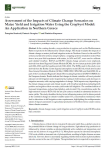Koukouli P., Georgiou P., Karpouzos D. (2025). Assessment of the impacts of climate change scenarios on maize yield and irrigation water using the CropSyst model: an application in Northern Greece. Agronomy, 01/03/2025, vol. 15, n. 3, p. 638.
https://doi.org/10.3390/agronomy15030638
https://doi.org/10.3390/agronomy15030638
| Titre : | Assessment of the impacts of climate change scenarios on maize yield and irrigation water using the CropSyst model: an application in Northern Greece (2025) |
| Auteurs : | P. Koukouli ; P. Georgiou ; D. Karpouzos |
| Type de document : | Article |
| Dans : | Agronomy (vol. 15, n. 3, March 2025) |
| Article en page(s) : | p. 638 |
| Langues : | Anglais |
| Langues du résumé : | Anglais |
| Catégories : |
Catégories principales 07 - ENVIRONNEMENTThésaurus IAMM CHANGEMENT CLIMATIQUE ; AGRICULTURE ; EVALUATION DE L'IMPACT ; RENDEMENT DES CULTURES ; ZEA MAYS ; EAU D'IRRIGATION ; SCENARIO ; MODELE DE SIMULATION ; GRECE |
| Résumé : | In the coming decades, crop production in regions such as the Mediterranean Basin is expected to be influenced by climate change. This study evaluates the impacts of climate change on maize yield and irrigation water in Northern Greece for the mid-21st century and late 21st century using CropSyst, a cropping systems simulation model. Data from a two-year field experiment with maize, in 2016 and 2017, were used to calibrate and validate CropSyst. RCP4.5 and RCP8.5 climate change scenarios were employed, derived from three Regional Climate Models (RCMs), for two future periods (2030-2050 and 2080-2100) and the baseline period (1980-2000). The RCMs used in this study were derived from the Rossby Centre regional atmospheric model (RCA4), which downscaled three General Circulation Models (GCMs), CNRM-CM5, CM5A-MR, and HadGEM2-ES, as part of the Coordinated Regional Climate Downscaling Experiment (EURO-CORDEX) for the European domain. Results indicate that changes in climate variables will exert potential pressure on full irrigation water requirements, leading to both increases and decreases in irrigation amounts, with varying magnitudes of change. Yield impacts vary depending on the climate change scenario and climate model, with CropSyst predictions indicating both positive and negative effects on maize yield under full irrigation. The combined effects of increased temperatures, reduced precipitation, and elevated CO2 concentrations under the high-emission scenario RCP8.5 by the late 21st century resulted in substantial declines in maize yields. The study identifies the key factor influencing maize yield in future periods as the combined changes in climate variables under CO2 concentration enrichment, which lead to alterations in full irrigation water requirements, highlighting the multiparameter nature of impact assessment on agricultural production in Northern Greece under various future climate scenarios. |
| Cote : | En ligne |
| URL / DOI : | https://doi.org/10.3390/agronomy15030638 |







